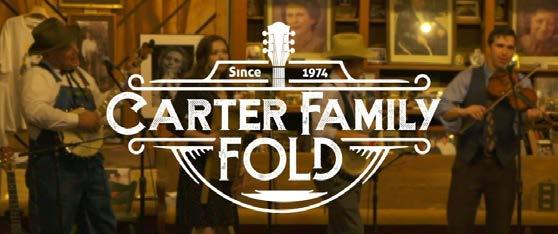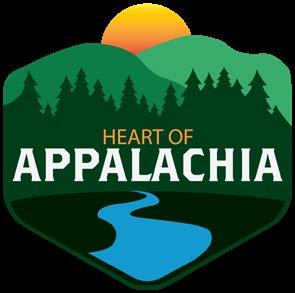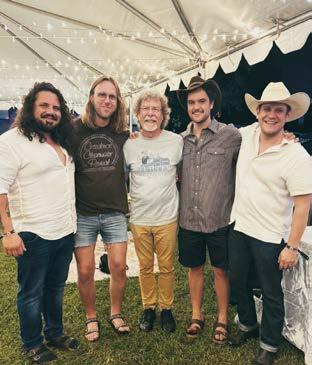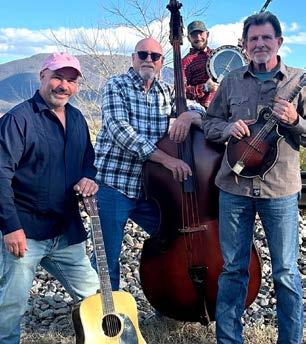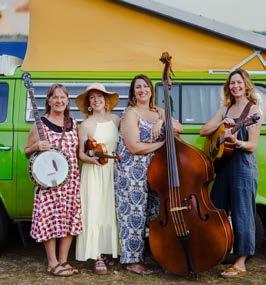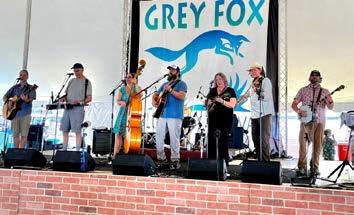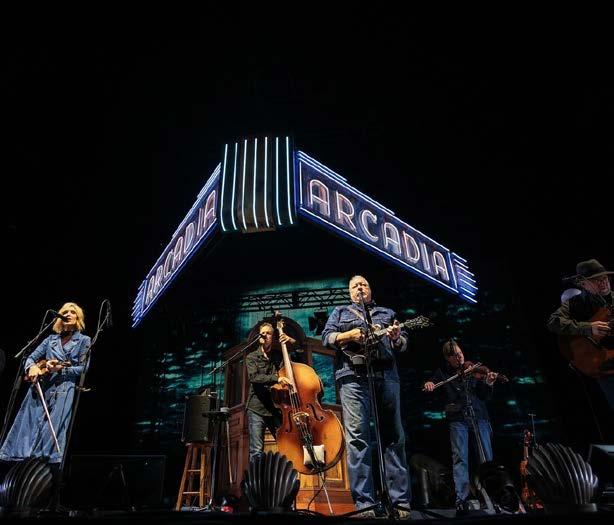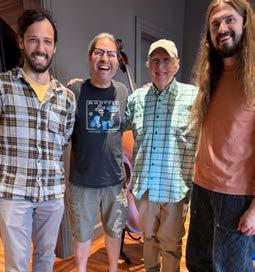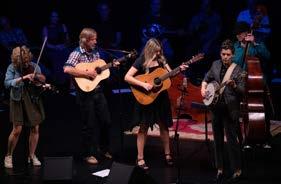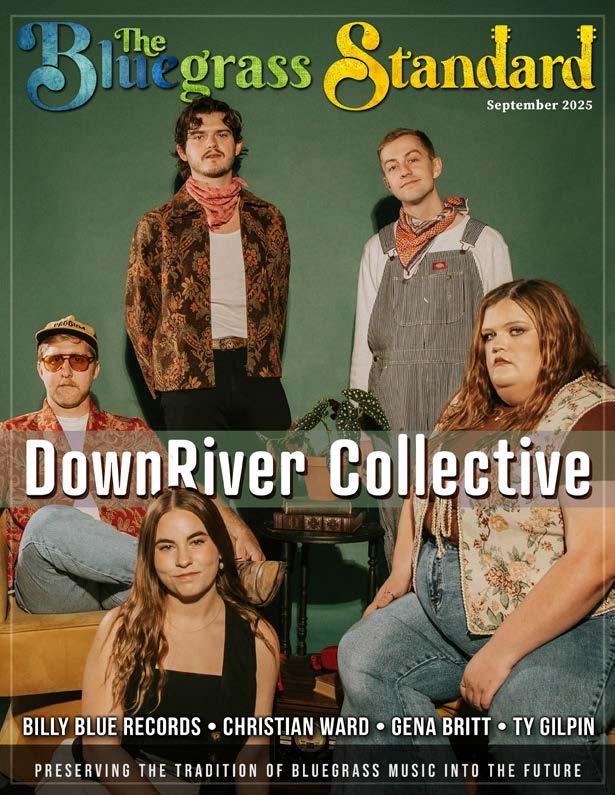




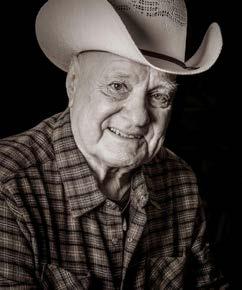

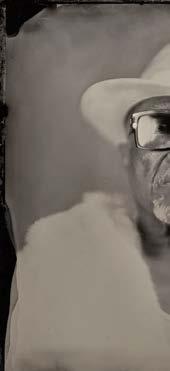

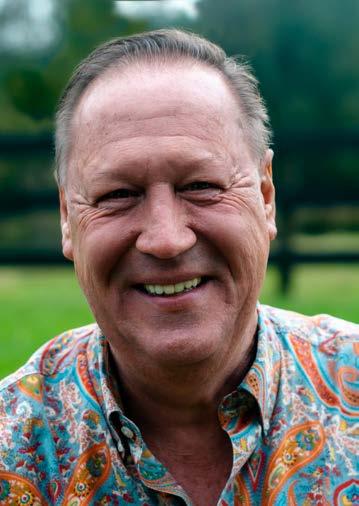
Keith Barnacastle •






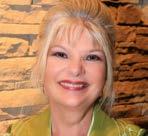




















Richelle Putnam holds a BS in Marketing Management and an MA in Creative Writing. She is a Mississippi Arts Commission (MAC) Teaching Artist, two-time MAC Literary Arts Fellow, and Mississippi Humanities Speaker. Her fiction, poetry, essays, and articles have been published in many print and online literary journals and magazines. Among her six published books are a 2014 Moonbeam Children’s Book Awards Silver Medalist and a 2017 Foreword Indies Book Awards Bronze Medal winner. Visit her website at www.richelleputnam.com.
Rebekah Speer has nearly twenty years in the music industry in Nashville, TN. She creates a unique “look” for every issue of The Bluegrass Standard, and enjoys learning about each artist. In addition to her creative work with The Bluegrass Standard, Rebekah also provides graphic design and technical support to a variety of clients. www.rebekahspeer.com
Susan traveled with a mixed ensemble at Trevecca Nazarene college as PR for the college. From there she moved on to working at Sony Music Nashville for 17 years in several compacities then transitioning on to the Nashville Songwritrers Association International (NSAI) where she was Sponsorship Director. The next step of her musical journey was to open her own business where she secured sponsorships for various events or companies in which the IBMA/World of Bluegrass was one of her clients.
Susan Marquez is a freelance writer based in Madison, Mississippi and a Mississippi Arts Commission Roster Artist. After a 20+ year career in advertising and marketing, she began a professional writing career in 2001. Since that time she has written over 2000 articles which have been published in magazines, newspapers, business journals, trade publications.








Singer/Songwriter/Blogger and SilverWolf recording artist, Mississippi Chris Sharp hails from remote Kemper County, near his hometown of Meridian. An original/founding cast member of the award-winning, long running radio show, The Sucarnochee Revue, as featured on Alabama and Mississippi Public Broadcasting, Chris performs with his daughter, Piper. Chris’s songs have been covered by The Del McCoury Band, The Henhouse Prowlers, and others. mississippichrissharp.blog
Brent Davis produced documentaries, interview shows, and many other projects during a 40 year career in public media. He’s also the author of the bluegrass novel Raising Kane. Davis lives in Columbus, Ohio.
Kara Martinez Bachman is a nonfiction author, book and magazine editor, and freelance writer. A former staff entertainment reporter, columnist and community news editor for the New Orleans Times-Picayune, her music and culture reporting has also appeared on a freelance basis in dozens of regional, national and international publications.
Candace Nelson is a marketing professional living in Charleston, West Virginia. She is the author of the book “The West Virginia Pepperoni Roll.” In her free time, Nelson travels and blogs about Appalachian food culture at CandaceLately.com. Find her on Twitter at @Candace07 or email CandaceRNelson@gmail.com.
A Philadelphia native and seasoned musician, has dedicated over forty years to music. Starting as a guitar prodigy at eight, he expanded his talents to audio engineering and mastering various instruments, including drums, piano, mandolin, banjo, dobro, and bass. Alongside his brother, he formed The Young Brothers band, and his career highlights include co-writing a song with Kid Rock for Rebel Soul.
Stephen Pitalo has written entertainment journalism for more than 35 years and is the world’s leading music video historian. He writes, edits and publishes Music Video Time Machine magazine, the only magazine that takes you behind the scenes of music videos during their heyday, known as the Golden Age of Music Video (1976-1994). He has interviewed talents ranging from Ray Davies to Joey Ramone to Billy Strings to Joan Jett to John Landis to Bill Plympton.


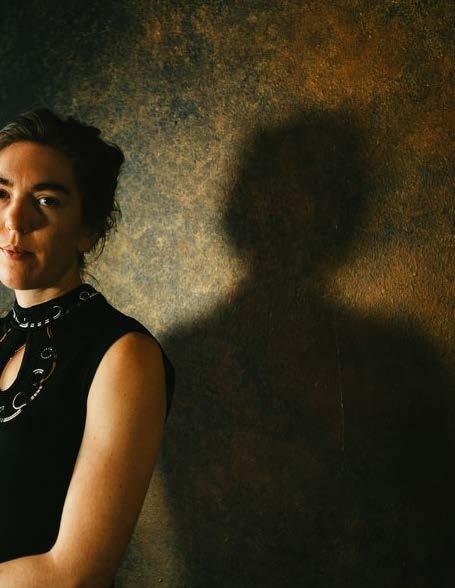
Highly acclaimed singer-songwriter, multi-instrumentalist, and producer Maya de Vitry is back writing songs after releasing her fourth solo LP, 2024’s self-produced The Only Moment.
De Vitry has extensive songwriting and collaborations with her former band, The Stray Birds, Della Mae, Molly Tuttle, and The Woods Brothers, among many others. Still, she remains focused on creating new music. “I’m not taking on anything this summer as far as producing, so I will have some time to do some more writing.
“I definitely have a lot of ideas for albums, like a winterthemed album, to a string band record, to singing a bunch of duets with people,” reveals De Vitry, who has kept busy producing other artists.
De Vitry, who produced four albums including Joel Timmons, Shelby Means, Hanna Dylynn and Aiden VanSuetendael, felt overwhelmed. “It was a lot for me to do those four records back-to-back. Between Joel, Shelby, Hanna, and Aiden, they are such different records.
“Honestly, I just felt it was more realistic for me to put my energy into the other artists’ records and to not spread myself too thin,” remembers De Vitry, who put her record The Only Moment on hold. “I thought ‘I’m gonna work on those projects and keep touring.’
“We started recording [The Only Moment] in the summer of 2021. I put it away because that fall, Joel Timmons asked me to produce his record [Psychedelic Surf Country,] so I totally shifted gears.
“You don’t necessarily get paid right away,” explains the Nashville artist about her music. “Joel is asking me to produce a record. That’s like a job! I’m gonna take that job!” [Laughs]
De Vitry worked on The Only Moment in between sessions for Joel Timmons and Shelby Means.
“I would go in the studio every couple of months and just do something to my record. Maybe I would add a couple of harmony vocals.” De Vitry called on her friend, Texas singer-songwriter Phoebe Hunt. “I would ask, ‘Can you sing on these four songs?’ And over time, that became, ‘I think I want you to sing on the whole record!’”
“Most of the songs were tracked in 2021, but I ended up adding two songs [“Nothing else Matters”] [“Watching the whole sky Change”] later on. Those are songs I just tracked totally solo.”
De Vitry took her time.
“I learned so much about slowing down the process—seeing how the gears turn. I think it’s a narrative that we are taught: strike while the iron is hot, or record this song while it’s really feeling alive, then get out there and tour right away!
“The process takes so long,” explains De Vitry. “Sometimes people record a record, then they are shopping it around to record labels for two years. I could have put it out as fast as possible, but I don’t think I would have felt as fulfilled.”
After producing Joel Timmon’s record and collaborating with producers Dan Knobler and Ethan Jodziewicz on her previous albums, De Vitry produced The Only Moment.
“I felt like I had been around those kind of musical decision situations. I knew enough players to put people’s chemistry together.”
De Vitry says producing is much more than just music.
“I think everyone needs a different thing in a producer. Some people need a therapist and a coach,” De Vitry explains. “Some people need somebody who is really musically involved, like Shelby’s record; just being there to cheer her on in doing those vocal takes.”
She believes her strength is arranging.
“It’s how to get that song from just playing it on my guitar to leaving space in the arrangement for all the instruments to be best used.”
Maya loved working with her good friend, guitarist/singer Joel Timmons.
“He’s such a natural performer! He is so at home with his songs, and he is so at home on the guitar. What was different for him was being the center of attention because he’s such a band member. He sang all those songs in such a fun and honest way.
“Some of the songs were full of humor while others were brooding and dark-filled with different kinds of pain,” shares De Vitry about Joel’s songwriting. “He got to go to those places, too. It was such a joy to see those songs come to life.”
With no plans for producing shortly, De Vitry has other ideas. “This summer, I’m going to Colorado. I’m really excited about that! Not just to do some playing but some hiking. I would like to do more writing around certain themes.”
Going on, “I want to make a record that is totally solo—like me playing guitar or clawhammer banjo and singing. Those things feel like they are around the bend.”
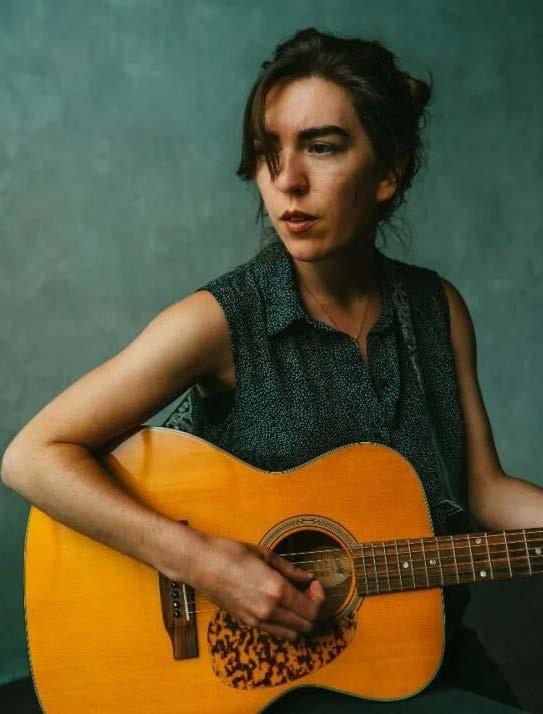

In the world of country music, Ty Herndon needs no introduction. With so many charting radio singles – including several that snagged the #1 slot – he’s no slouch in the ‘hit song’ department. What’s more, in 2014, the Grammy-nominated performer also made waves for change as the first major male country artist to come out in public as gay.
This year, Herndon will release a recording commemorating 30 years of his career milestones, setbacks, triumphs, and growth. This fall, he’ll give fans the first half of a two-volume retrospective album; it marks the anniversary of when he initially broke through on the country scene with his first #1 hit, “What Mattered Most.”
The first volume of the album – titled “THIRTY” – will drop during October. Volume 2 follows in 2026. “THIRTY” includes “reinterpreted hits” and “all-star collaborations.”
The first single, already released, is a new version of “What Mattered Most,” featuring a duet with country superstar LeAnn Rimes.
“We took a look at my back catalog and found what I like to call the ‘hits’ and the ‘misses,’” Herndon explained to The Bluegrass Standard. “Of course, we’re including the chart toppers like ‘What Mattered Most’ and ‘Living In A Moment,’ but we’re also digging deeper into album cuts to pull out some things that I think could have been big hits.”
“You know,” he continued, “back in the ‘90s, if you got two or three singles off an album, you were doing good. Then the label was ready for us to release that next album. In that process, so many good songs were left on the table, so I’ve gone back and given some of those a facelift, too.”
“The one common denominator is that every song on the new album features another artist, so I’m getting to work with some amazing legends as well as some newcomers that I just love,” he added.
A case can be made that Rimes – an international multi-platinum selling singer and songwriter, and veritable country powerhouse – is headed for that “legends” category.
“I have known LeAnn since she was seven years old,” Herndon explained, “and when ‘What Mattered Most’ came out, she was on tour with me as my opener. It wasn’t long, though, before a little song called ‘Blue’ broke through, and she was suddenly a superstar.”
Herndon said doing this duet with her was an obvious, quite natural move; she used to join him onstage to sing it with him way back when, on that first tour they did together.


“We’ve been good friends for a long time, and I’m so proud of all her success and the incredible woman she has become,” Herndon added.
When asked whether he feels he has grown creatively over the years, his desire for challenge makes it clear why he’s been able to keep stepping into the spotlight repeatedly despite his career waxing and waning over time.
“Reba [McEntire] once told me if you’re not growing and changing, you’re not doing it right,” Herndon reminisced. “So, I’ve always tried to challenge myself and level things up each and every time.”
One example he mentioned is his evolution into songwriting.
“The labels never let us write our own songs back in the day, so in these recent years, I’m proud that I’ve been a part of the writing process on my new work, like my last album ‘JACOB,’ where I co-wrote just about every track on that album. “
“Overall, I just think my songs are more personal these days,” he added. “They’re about my life, but they’re also about the common things we all experience – love, loss, heartbreak, confusion, fear and ultimately gratitude.”
One way Herndon showed some of that gratitude over the past decade was to encourage industry professionals and fans alike to be more amenable to differences among people within the country genre. To that aim, he launched the Concert for Love and Acceptance, which just wrapped its tenth and final year.
“When I came out [in 2014] only one person had done it before, and that was my good friend Chely Wright. What a pioneer she was and is,” Herndon said. “I felt like I suddenly had a platform to help make the path a little easier for others, so I joined forces with my friends at GLAAD, and we just hosted the 10th anniversary show here in Nashville. There are still so many challenges for LGBTQ people in country music and everywhere else, but I think it’s gotten a lot better in these last ten years, and I hope we’ve been a small part of that.”
As for the year of looking back, Herndon had a message for his fans.
“I just appreciate all those fans who have stuck with me over these last 30 years,” he said. “It’s been a lot of ups and downs, but the one thing that remains is the music. Good music is good music, and I just hope I’ll be around to keep making it for another 30.”
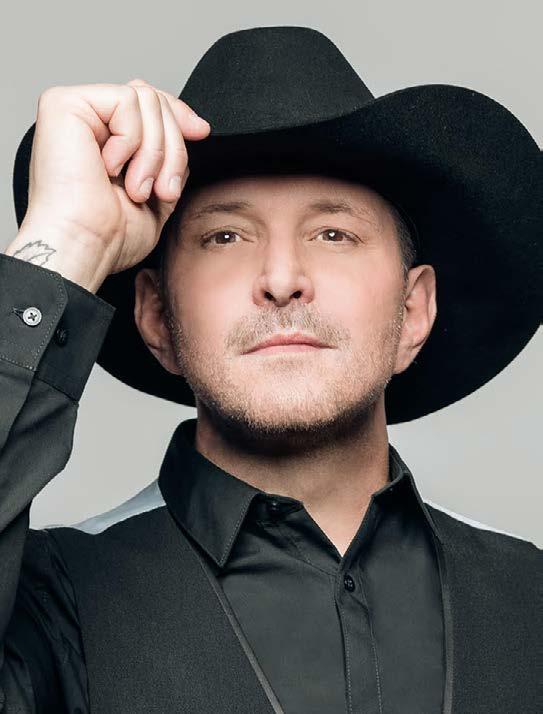

by Stephen Pitalo

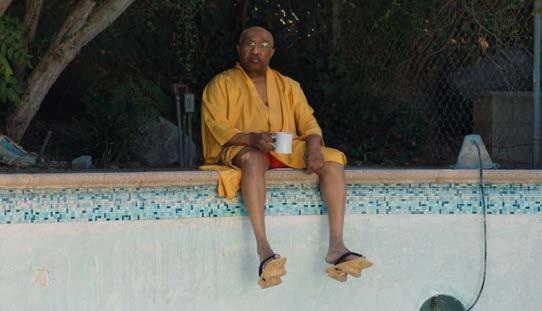
For readers of The Bluegrass Standard, the name Swamp Dogg might not ring a bell. But for the past six decades, Jerry “Swamp Dogg” Williams has been a thorn in the side of the music industry a soul singer, producer, songwriter, and cult figure whose eccentricity and creative ambition have kept him just under the mainstream radar. And now, at 81, he’s done something no one saw coming: a bluegrass album.
“Blackgrass: From West Virginia to 125th St.” is Swamp Dogg’s 26th studio album and possibly his most surprising. Released on John Prine’s Oh Boy Records, it trades in his signature auto-tune experiments for raw banjo, fiddle, dobro, and the Appalachian soul that first inspired him.
“Not a lot of people talk about the true origins of bluegrass music, but it came from Black people,” Swamp Dogg says, having grown up in West Virginia and never forgetting his roots. “The banjo, the washtub, all that stuff started with African Americans. We were playing it before it even had a name.”
Though some might scratch their heads at Swamp Dogg’s pivot into bluegrass, the man’s got country credentials. He co-wrote “She’s All I Got” with his buddy Gary U.S. Bonds a song that Johnny Paycheck took to No. 2 on the country charts in 1971. Conway Twitty, Tracy Byrd, and Tanya Tucker (as “He’s All I Got”) covered the tune. And if you
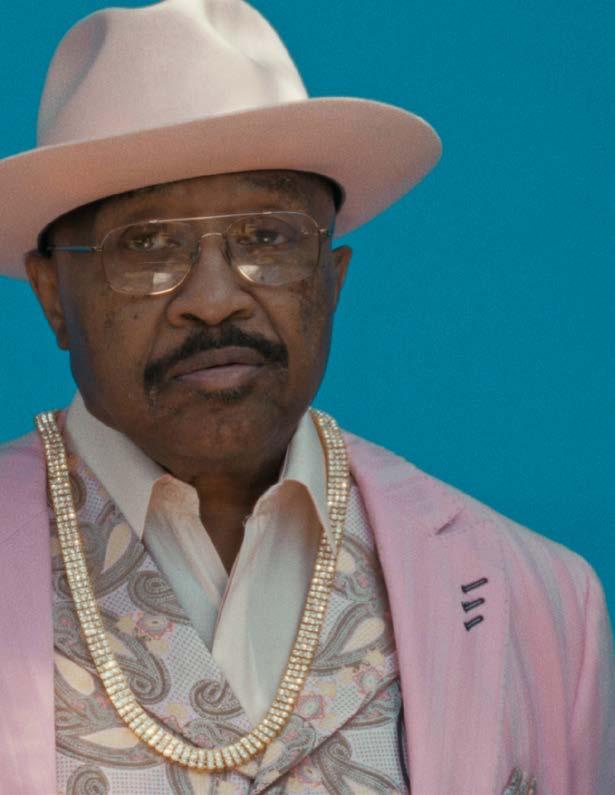
caught the Johnny Paycheck episode of the Cinemax animated series Mike Judge Presents: Tales From the Tour Bus, you’d have heard Swamp Dogg’s voice and seen his likeness right there alongside the honky-tonk legend.
“Going back to 1973, I put out an album called ‘Swamp Dogg’s Greatest Hits’ there were no hits on it, just all brandnew songs,” he laughs, cracking himself up. “On one of those songs, the main instrument was a banjo played by this old redneck who didn’t care too much for Black folks but thought I was alright. That’s when I started getting my nerve up to try this stuff.”
In the following decades, Swamp Dogg became known as an underground legend — the guy who worked with Irma Thomas, Z.Z. Hill, Patti LaBelle, and even dabbled with the Commodores before Lionel Richie stepped to the mic. He’s an artist who has toyed with every groove imaginable, refusing to stay pinned to one sound. “I wanted to fuse country and soul music, Black music, rhythm and blues music I don’t know what you call it these days, but I wanted to fuse those. And I’m happy with
what I’m doing.”
Produced by Ryan Olson, who has worked with artists Bon Iver and Poliça, “Blackgrass” ropes in an all-star bluegrass lineup: Noam Pikelny, Sierra Hull, Jerry Douglas, Chris Scruggs, Billy Contreras, and Kenny Vaughan. Guest shots come from Margo Price, Living Colour’s Vernon Reid, Jenny Lewis, Justin Vernon, and The Cactus Blossoms. But for all the big names, the album still feels unmistakably Swamp Dogg.

“No matter who you bring in, it still has to come through me. It’s still my voice, my stories,” he says. “Deliver the message. You don’t have to open the envelope or anything, just deliver the message.”
One standout track, the mostly monologue
“Murder Ballad,” sprang from a collaboration with one of his rappers. “This was a whole rap thing, and what I did was pick through the song, find what I considered the highlights, and then expand on it. It’s the same story, but I made it much simpler,” he explains. “I split the publishing, I split the writers, because that’s how you do it.”
A remake of his own composition “Rise Up,” taps into something more defiant. “It could mean a lot of things,” Swamp Dogg says. “It could be, let’s incite a riot, or let’s come together. People who like country like ‘Rise Up,’ even though it’s not a country guitar that’s hard rock.”
The recording sessions of “Blackgrass” can be seen in the documentary “Swamp Dogg Gets His Pool Painted,” released this past spring. The film gives a rare glimpse of the chaotic, funny, and brilliantly weird world Swamp Dogg inhabits, all against the backdrop of the gradual painting of his swimming pool. “[The filmmakers] came to shoot a music video for ‘Love, Loss, and Auto-Tune,’ and then it turned into this whole thing,” he laughs as he explains how the documentary project started. “It’s got some weirdness, it’s got heart, it’s got some smarts, but you don’t know where it’s going to go.”
Swamp Dogg’s restless creative energy leads him down strange turns in the musical road, but he’s always at the wheel.
“I don’t really have a genre,” he muses. “I’ve been open to all kinds of music. I’ve got old classical albums. I took piano lessons for about a year, but I couldn’t get to where I wanted fast enough. So, I guess you could say that I took piano lessons from Jerry Lee Lewis and Fats Domino. That’s what I wanted to play anyway, and that’s what I’m still playing, but I’ve got it wrapped up in another way. If you listen intensely, you hear it: I’m doing the same thing, just switching it around. If it’s red, I’ll paint it green, and you’ll say, ‘Hey, he got a new one, it’s green,’ but man, that’s the same.”
For an artist who has spent his life dodging labels, “Blackgrass” feels like both a culmination and a provocation. Swamp Dogg has taken the music of the hills and hollers and run it through his own unruly filter, serving up something simultaneously traditional and entirely his own. After six decades of coloring outside the lines, Swamp Dogg gave us another picture, an alternative bluegrass album that will likely never be matched in tone, style, or flavor.
“I’d hate to leave this world not having tried everything I wanted to try,” he says.
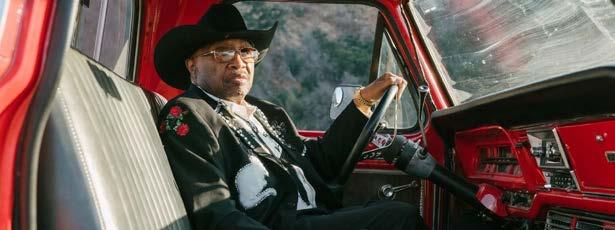



In a picturesque mountain town in western North Carolina, a new music venue/brewery/restaurant combo is supporting the growth of Americana, bluegrass, and other roots genres. What started as a straight-up brewery in Virginia – B Chord Brewing Company – has now relocated to Granite Falls, North Carolina, outside Hickory. Now called B Chord Live, the new iteration is bigger and better, offering a fresh take on both food and local music.
“We are trying to help build and foster bluegrass music,” explained Marty Dougherty, who co-owns B Chord with his partner, Melanie Bartenstein. “We provide a place for bluegrass musicians to flourish.”
“It’s mostly older people,” he lamented, about bluegrass music. In deciding the goals of the new venue, he asked himself: Why are there not more younger people involved in bluegrass? While the answer isn’t completely clear, Dougherty hit upon an idea he thinks might be part of the equation. He thinks there needs to be more venues that “offer it all,” in a way that appeals to younger folk.
“Young people wanna go to places that are kinda cool,” he explained. B Chord Live strives to do just that, and as of now, Dougherty seems to think it is already working.
“Suddenly, we have a whole new world of bluegrass people,” he said, of young new fans coming onboard due to being exposed to the music at his new venue.
He said the lineup is usually “string band or Americana-type music,” and even in this first year of operation, he’s already seen youth participation at the weekly open jam sessions.
“We have a bluegrass open jam on Tuesday nights,” he said. “We have some seasoned musicians show up to play, but then this kid broke out his guitar and started to play. He’s


Join us for the 11th annual
Island Storytelling Festival February 13 - 15, 2026

Relive past times and celebrate the best of humanity in the
Our beloved Emcee for our festival and Storyteller,
• Donald Davis - His long career as a storyteller and his promotion of the cultural importance of storytelling through seminars and master classes has led him to be
• - GRAMMY-nominated spoken word recording artist, an internationally known Oracle-Award-winning storyteller, and a sought-after teaching artist.
• Bil Lepp - Award-winning storyteller, author, and recording artist. He’s the host of

• Sheila Arnold - Master Storyteller, Historic Character Interpreter, Teaching Artist. She has a talent for storytelling, a passion for history, and compassion for people. Registration and Schedule: www.StSimonsIslandStorytellingFestival.com




been there five or six times on Tuesday nights.” He said the older players welcomed him with open arms, something common in bluegrass. At B Chord Live, it’s important to Dougherty and Bartenstein to foster that type of support environment for budding musicians.
Although neither co-owner is a musician, they have been deeply embedded in the bluegrass community for many years. B Chord provides video production services for various festivals and produces music videos for artists.
“We’ve been running the video crew at DelFest for 15 years,” Dougherty said, of one of their more notable yearly events. “We’re very well ingrained in the bluegrass scene.”
On the restaurant side of the property, Dougherty said the offerings are a departure from what most eateries offer in that neck of the woods. Diners will get fresh, locally sourced ingredients.
“There’s a lot of restaurants who just serve frozen or fried,” he explained, “but we wanted to get away from that. The poultry, beef, steaks, vegetables, greens…they’re all fresh, not frozen.”
Currently open Wednesday through Sunday, B Chord offers not only music, food, and of course beers crafted at the brewery, but it also hosts Corn Hole tournaments; has an additional assortment of over 30 choices of beers; offers an array of cocktails; and fosters a a vibe that will hopefully lead B Chord Live to becoming a hub for roots music in the quaint mountain town. Expansion plans include opening an additional stage in an adjoining space, and building “a larger stage for national acts, and to host community events.”
Dougherty explained why he loves bluegrass culture so much: He has made it both a business and a labor of love.
“People in bluegrass are very loyal to each other, and to what they do,” he explained. “They’re so much a family.”


by Susan Marquez
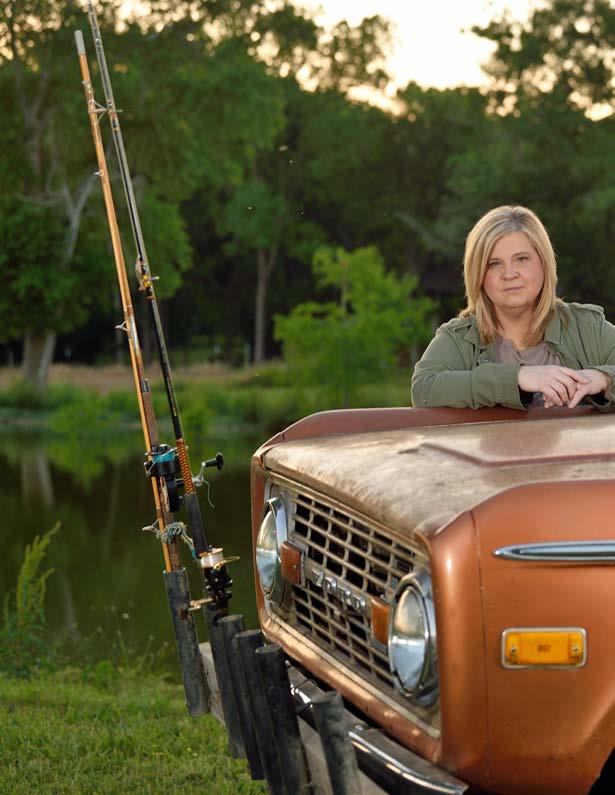
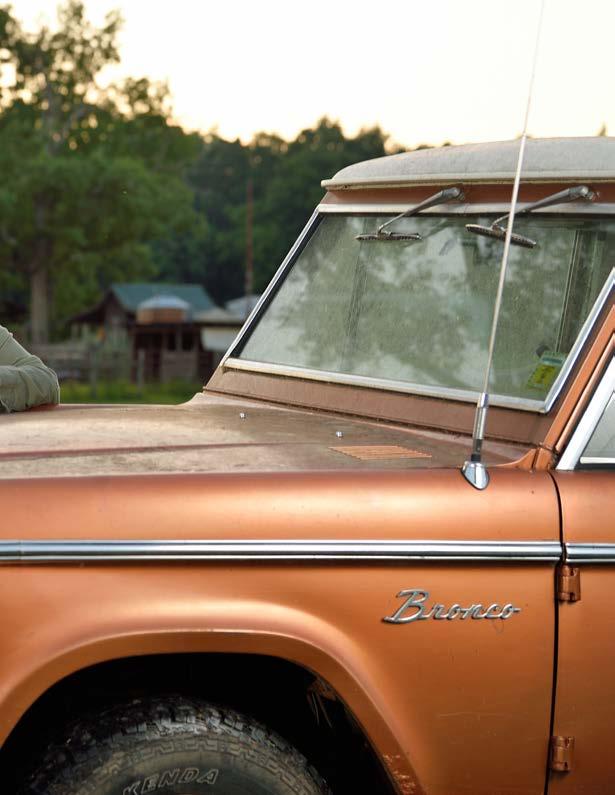
Maybe it was prophetic that Gena Britt grew up in the dance halls of Star, North Carolina. It’s where the bluegrass star, known for her powerful banjo playing, solid bass playing, and powerhouse vocals, fell in love with bluegrass music at an early age. “My grandfather was a square dance caller, and he was busy somewhere every weekend. That was my introduction to string music.” By the age of five, she had learned to clog and participated in clogging competitions. At the age of seven, she performed on a local television program in Raleigh. “The show’s host asked what I wanted for Christmas,” recalls Gena. “I told him I wanted a banjo.”
It was another year before Gena got her banjo, and soon after, she started taking lessons from Charles Singleton. “Dad took me to his house once a week, and he showed me a lot of things, but ultimately I learned to play by ear. I listened to cassette tapes and practiced playing what I heard. Nowadays, kids pull up videos on YouTube. I only wish I had that growing up.”
Gena began playing professionally at an early age. As a teenager, she picked up the bass. “I met Andrea Roberts, I believe, at a bluegrass festival in South Carolina, and she was in the band Petticoat Junction. We jammed together, and they needed a bass player, and that’s how I started my career.” Gena played with the group for a couple of years. “I learned a lot from that experience. It was a good education on the music business for me.” After graduating from high school, Gena moved to Nashville.
Over the years, she played with New Vintage, Lou Reid and Carolina, Alan Bibey & Grasstowne, and for four years she had the Gena Britt Band.
She is a founding member of the powerhouse female group, Sister Sadie. “We started playing together thirteen years ago, and it’s been a fun ride,” Gena says. “All the women in the band are so talented, and we have a great time together.” Sister Sadie is on the road again with a new album that dropped at the end of June. “We work hard on our stage show,” Gena says. “There is no dead space.” Sister Sadie’s new album, All Will Be Well, is 90s country and bluegrass fusion – “it’s very diverse, and we make it ours. There are some incredible songwriters in this band right now. I’m writing a lot of songs of instrumentals.”
Gena released a single on Father’s Day called “He Likes to Fish,” a song she co-wrote with Katelyn Ingardia. “It’s based on my childhood memories with my dad. I have wonderful memories of going on fishing trips with my dad to the coast. I was joined in


the studio by Jason Carter, John Meador, Jonathan Dillon, and Jeff Partin, and I’m really pleased with how the song turned out.”
Gena, a founding member of The Daughters of Bluegrass, was part of IBMA’s Leadership Bluegrass Class of 2003 and has appeared on all their recordings. She has received seven IBMA awards. In 2001, she received the IBMA Recorded Event of the Year award for her work on Follow Me Back to the Fold by Mark Newton. She won the Recorded Event of the Year award in 2006 for Back to the Well by the Daughters of Bluegrass and Album of the Year for her contribution to A Celebration of Life for Musicians Against Childhood Cancer. In 2017 and 2018, Sister Sadie won Emerging Artist of the Year. She has taken home three IBMA Vocal Group of the Year awards in 2019, 2020, and 2021 with Sister Sadie and the coveted Entertainer of the Year award in 2020 as a member of Sister Sadie. The band received GRAMMY nominations in 2018 for Sister Sadie II (Pinecastle Records) and in 2025 for No Fear. Gena was nominated for SPBGMA’s Banjo Player of the Year award in 2021, 2022, and 2023, and received the award in 2022. She received the title of Female Vocalist of the Year in 2002, and in 2007, Back to the Well by Daughters of Bluegrass was awarded Album of the Year. Gena resides in eastern North Carolina with her two daughters, Jalyn and Dalsyn.
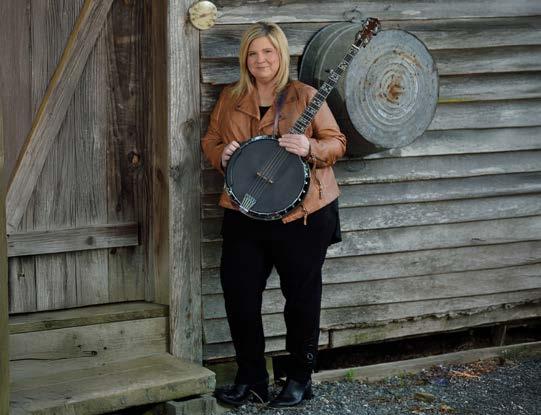
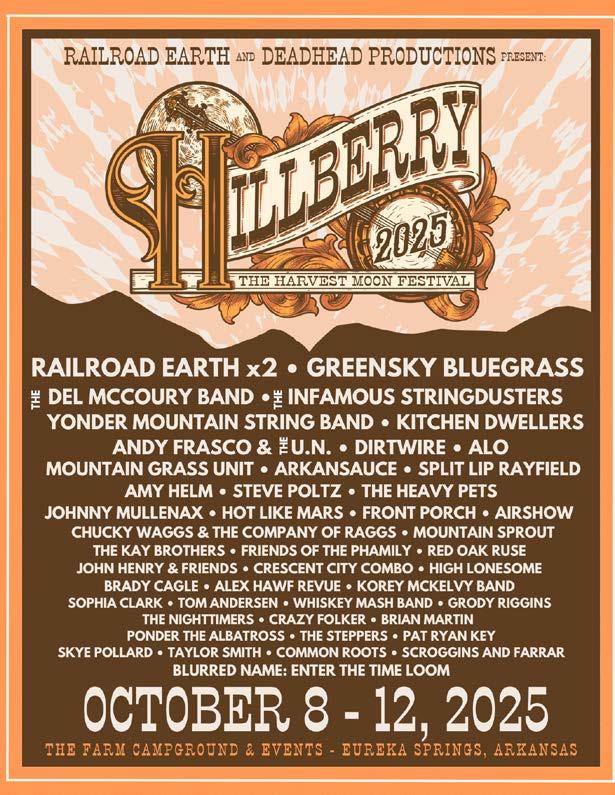

by Susan Marquez

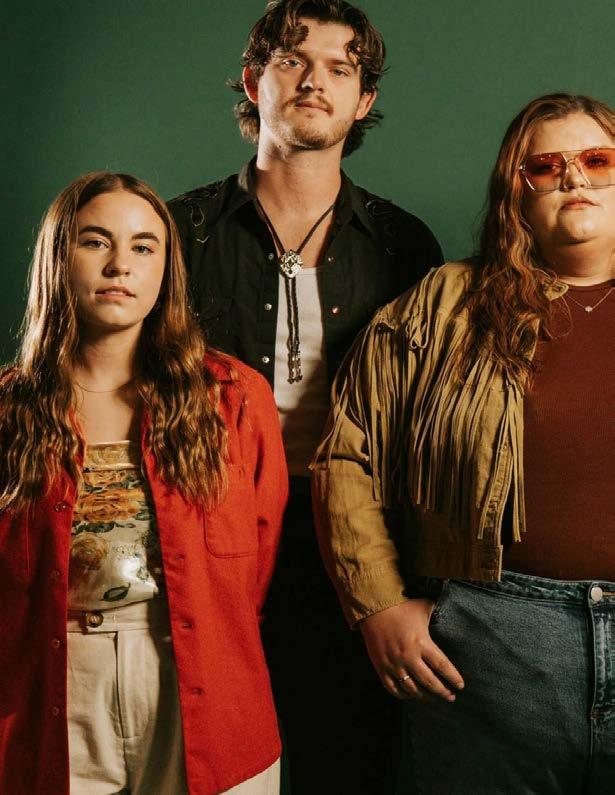


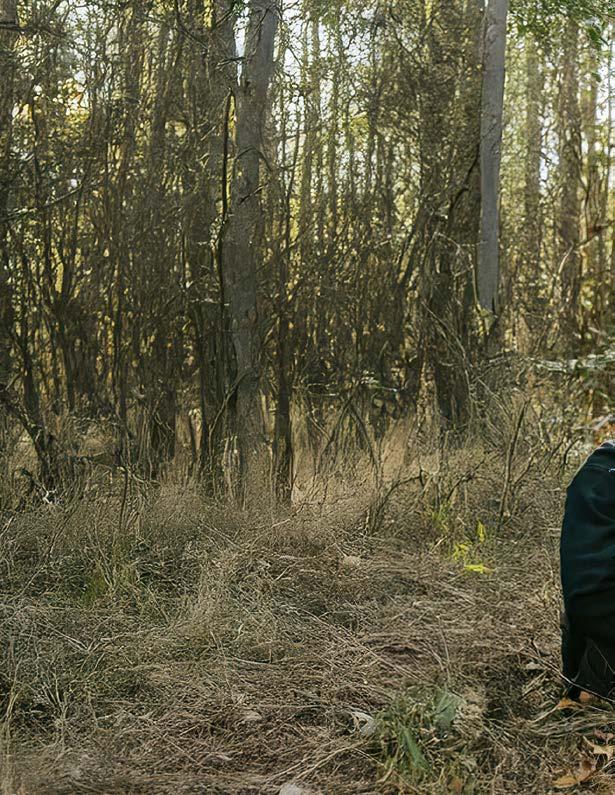
Watching DownRiver Collective perform is like watching a finely tuned machine. Audiences are treated to the silky-smooth vocals by Ali Vance accompanied by Bailey Warren (fiddle, background vocals), John Gray (banjo, guitar, background vocals), Rico Wallenda (mandolin) and Jonny Therrien (acoustic guitar and dobro). Their music is a melting pot of sorts – inspirations vary widely from band member to band member. Still, as a whole, they find themselves drawing on Chris Stapleton/SteelDrivers and Alison Krauss and Union Station the most. Other artists they are excited about are The Chicks, Madison Cunningham, East Nash Grass, Andrew Marlin, Shania Twain, Tyler Childers, and Sabrina Carpenter.
John Gray and Bailey Warren (with former member Danny Tucker) started the band in 2018 as a folk trio. After years in the bluegrass ensemble at Belmont University, where they honed their skills and met other like-minded players (i.e., the rest of the band), they naturally shifted gears and started to chase down a bluegrass sound. More than anything, they wanted to lift up Ali’s powerhouse vocals and get to be her band. Adding Ali was a pivotal turning point in the band’s sound and trajectory. The band, as it is now, has been recording and performing together for four years.
DownRiver Collective came by their name via band member John Gray. His family has a cabin in the Shenandoah Valley, and he grew up frequenting the Shenandoah River, where there is a canoe and raft rental company called Downriver Canoe Company. In high school, he played a talent show with a friend, who, when asked what their “band” name was, quickly turned to Gray, saw his Downriver Canoe Company hat, and said, “We’re Downriver Collective.” The name stuck with Gray as he started pursuing music in college.
The Nashville-based band describes their music as “modern bluegrass.” With elements of traditional bluegrass, old-time folk, and classic country along with flavors of Americana, rock, and modern pop, the band’s music reflects their musical passions. “As we’ve continued to write together, we’ve started to realize that we’re a bluegrass band that doesn’t write bluegrass music, and it kind of happened by accident,” says Bailey. “We play bluegrass instruments, and are all well-versed in the style of bluegrass, but it seems that we can’t help but incorporate elements of other genres, usually whatever we’ve been listening to most recently, into our songwriting. Most importantly, Ali’s intuition when it comes to vocal melodies is very natural and unique. There’s nothing forced about it, and what she comes up with sometimes feels genre-less.”
DownRiver Collective’s first EP as a full band, Off the Shelf, was released in Fall 2023. The EP is comprised of all original tunes. “Most songs, like ‘Dead to Me,’ were 100% collaborative, written by the whole band, says Bailey. Others, like “Walls,” were written by two or three of the members. “We had been writing for a year or so and were eager to get a physical CD out into the world. We pooled the best songs we had at the time and got in the studio with our producer Caleb Christopher Edwards, and engineer Dewey Boyd, at Forty-one Fifteen in Nashville to bring something to life.”
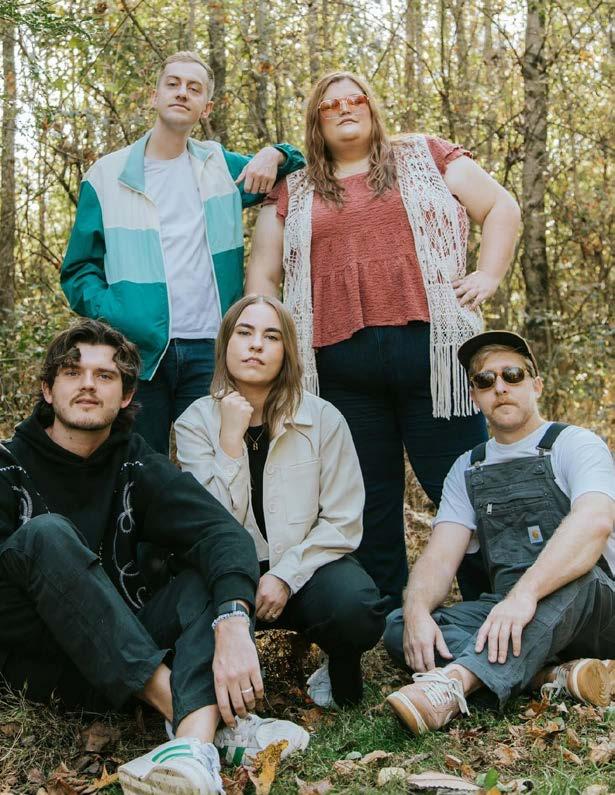
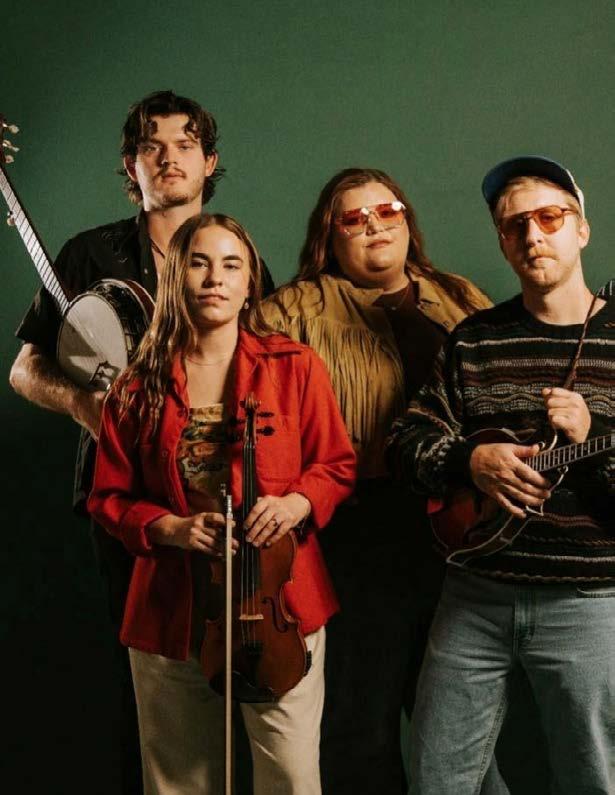

IBMA named the band the 2024 IBMA Momentum Band of the Year. “It was truly unbelievable and unexpected,” Bailey says. “We are admittedly embarrassed by our acceptance speech; not a single one of us actually anticipated winning or gave a single thought as to what we’d say if we got up to the podium. It seemed so unlikely at the time. On the flip side, I think our lack of preparedness showed just how genuinely humbled we were to win the award. We are so grateful to IBMA. They continue to show us so much support and lift us up any chance they get.”
“Come On Back” was released on April 4 as the lead single from their upcoming album, which arrives this fall. The song, initially written as an old-time instrumental fiddle tune, Ali and Gray later added lyrics to. “Gray was inspired to write from personal experiences of watching family members relentlessly chase down and fight for loved ones battling very serious mental illnesses,” explains Bailey. “He writes from the perspective of the one at home, who is holding on to hope and fighting to remain steadfast.”
The upcoming album was recorded with producer Caleb Christopher Edwards and engineer Dewey Boyd at Fortyone Fifteen. “We were so happy with the process and product of recording ‘Off the Shelf’ that we wanted to run it back.”
DownRiver Collective continues to gain recognition. The band was named the 2025 FreshGrass Bentonville Awards Band winner. “We so thoroughly enjoyed the performances from all the band competition finalists, we would’ve been happy to lose to any of them. I think the biggest win from that day is that Alison Brown caught the first four songs of our set. We could all feel the energy shift on stage as we noticed one of our heroes paying attention to us. We are so grateful to her and Compass Records for awarding us a studio day with them, as well as the prize money from the FreshGrass Foundation. We have been writing and dreaming up a deluxe version of our forthcoming record, and this win will make it possible to bring that to life.”
by Jason Young

Kamel: Analogue Album Reassures We’re All Gonna Live






If the bells and whistles of the digital world are not your thing, it isn’t Tony Kamel’s either. His latest album, We’re All Gonna Live, is full of energy and saturated in analog.
“I’m not against Pro Tools (digital recording software),” says Austin, Texas, singer-songwriter Tony Kamel. “What I have learned is you don’t need everything that it offers. You can live without certain things if the energy is there.
“One of my favorite things about [analogue] is there’s no computer screens, so you can’t see the [audio] wave forms,” explains Kamel, who recorded his latest album on an analogue tape machine.
“When you really dig into digital recording, it can trick your brain into things being wrong.”
The Grammy-nominated performer favors cutting live tracks with his band.
“It’s hard to put into words. You’re chasing this feeling! It’s like feeling and emotion. It has almost nothing to do with perfection.
“We sat down, we talked through the songs, and we sussed out some of the arrangements. It’s just so that we go into the studio a little more prepared. When you’re doing everything live, a little preparation can go a long way.”
But over-rehearsing, Kamel warns, isn’t always a good thing.
“I think it’s important to leave room for stuff that could happen. Too much preparation can be hindering.”
The former Wood & Wire frontman says cameras were rolling while they recorded.
“I like pressure! It’s not because I’m some bad ass dude, it’s because I procrastinated on everything my entire life,” explains Kamel who was comfortable while filming. “I love to perform, so I always thrived on
that kind of thing.
“Now the record is out, I’m going to release videos from the session periodically for the next couple of months.”
He teamed up again with fellow Texas songwriter and producer Bruce Robinson,
“I learned a lot,” Kamel says about Robinson, who collaborated with him on his debut solo album, Back Down Home. “He has taught me to hold myself to a higher standard. We just connected as friends and people—we’ll always be connected and I’m happy about that.”
The breakup of his former band Wood & Wire left Kamel uncertain about the future.
“I thought maybe I could do music for fun again and then get a job. Fortunately for me, Bruce Robinson wanted to make a record—so we did!”
Kamell says the lyrics to the songs on his new album are about life’s ups and downs.
“It’s very important to be positive in life. You will notice on the front cover of the new record that I’m all beat up. It’s based on a quote I got from my grandmother, which is printed on the back of the record. She said, ‘Eventually life starts to knock you around, --you’ve got to be ready to fight with a smile.’
“I think a lot of people were confused,” the songwriter shares about the album cover.
“I wanted to have some artistic expression around it. It definitely started some conversations.
“I’ve been too self-conscious in the past to do something like that [laughs]. But now that I’m getting older, I thought, You know what? Who cares!”
Kamel credits his old bandmates for guiding him early on.
“Wood & Wire was extremely fulfilling. There is a lot I miss about them. Those
guys are the best musicians I’ve ever played with,” adding, “We were so locked in!”
“I was so green when I came into Wood & Wire. I learned so much from them,” reminisces Kamel, sharing that the other members should have gotten more attention. “I don’t think they have been given their due as the instrumentalists and musicians that they are.”
The Austin singer expresses gratitude for his current band, which features musicians Noah Jeffries, Cameron Owens, Kym Warner, and Josh Blue. “I was lucky enough to play with some of the best musicians in the world on this album (We’re All Gonna Live).”
Kamel feels the album will succeed in drawing a bluegrass audience, but could be a little confusing for some.
“If you’re a bluegrass fan, listen to this record like you would a John Hartford record, not a Bill Monroe record. If you are expecting the unexpected, then I think you will enjoy it.”
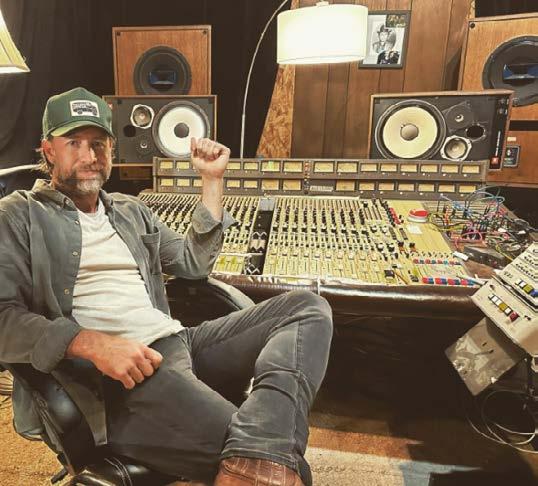
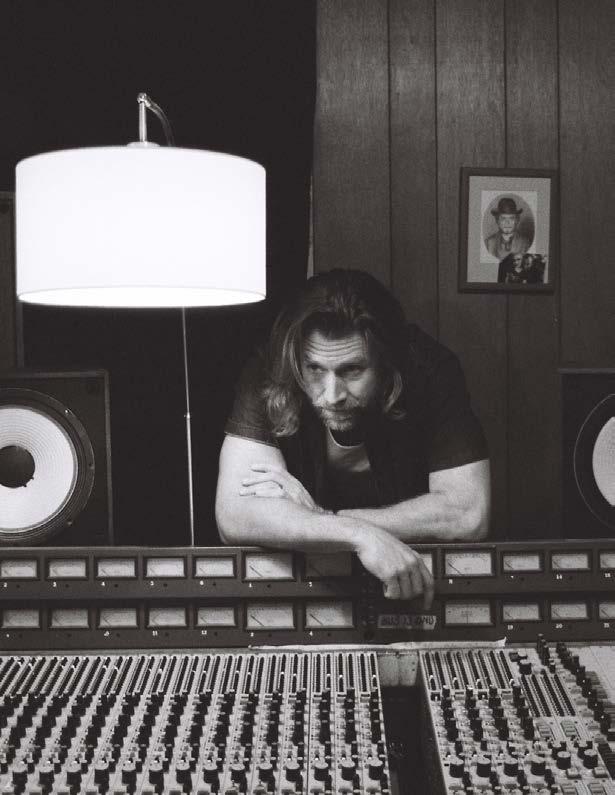











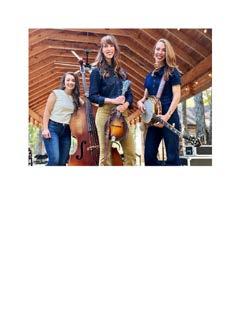






by Stephen Pitalo
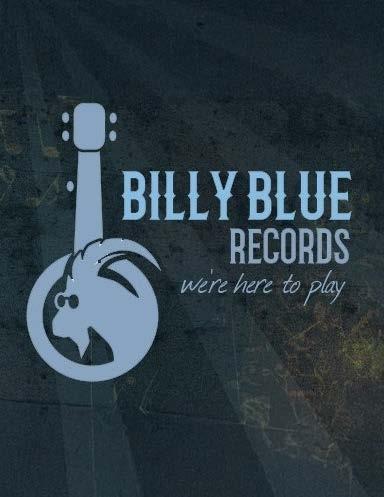

Success doesn’t come with a velvet rope or a red carpet in the backroads and backrooms of bluegrass music. It comes with long hours, battered guitars, calloused hands, and a fire that never quite burns out. That’s the world Billy Blue Records was born into and under the quiet but determined leadership of Jerry Salley, it’s a label that has turned small beginnings into a heavyweight punch.
“For years I’ve been producing a lot of different acts that were independent artists, and a lot of them would just say, ‘Hey, I wish you had a label for us to be on,’”
Salley recalls from the Billy Blue Records humble beginnings in 2007. He wasn’t a fresh-faced newcomer hoping to make it big; he was already a decorated songwriter with over 500 recorded songs and more than 18 million records sold worldwide. But like any good story, his journey circled back to where his heart was. “I think I know what their needs are… I was just trying to start something that we could be, that would be first class, keep it small, and be able to give our artists the resources they would need to be successful.”
Salley came into Billy Blue with a business plan shaped by decades of experience as an artist and songwriter who is respected – nay, revered – in the country genre. “I knew about airplay, I knew how to get records out to radio,” he explains. “It’s funny, a lot of people call it politics, but it’s really relationships, right? If you have relationships and you treat people right and kind, they remember that.”
He didn’t come to build a factory; he came to build a family. That’s why the first signing — Appalachian Road Show — mattered so much. “We were blessed now with some great artists, Appalachian Road
Show was the first act we signed, and they had a number one record right off their first album,” Salley says. “Then, we were able to sign Joe Mullins and the Radio Ramblers and also Doyle Lawson. And so we just really started out in a good way.”
The label’s second year saw two Grammy nominations, no small feat for an operation that insists on staying deliberately sharp and buttoned up.
“We had Doyle Lawson’s Live in Prague, Czech Republic, up for Bluegrass Album of the Year and the same year, Gonna Sing, Gonna Shout was up for Best Gospel Roots Album of the Year. So those were huge moments, to get an opportunity to get a Grammy in your second year of business was pretty crazy.”
Salley balances reverence for the past with excitement for the future. “I never want to not tip my hat and pay respect and have some traditional acts. I think that’s extremely important, because you can’t know where you’re going if you don’t know where you came from,” he says. “But as a producer and as a writer and as a label guy, I have to say, there’s a lot of the newer stuff that I absolutely love.”
This is a label run like a family, not a machine. “I just try to reach out and try to be a dad to the younger acts just because I’m trying to teach ’em what I know and what I’ve learned,” Salley explains. “As important as what I’ve learned to do is the stuff that I’ve learned not to do, like, don’t think you’re bigger than you are. If you treat people right, they will remember that forever.”
Billy Blue Records still believes in physical
products like CDs, vinyl, and thumb drives. “We still believe people want that physical piece. A lot of the time, they just want it for a memory, from the evening to take home with them and have something to remember the night by. We’re going to continue to make it till there’s nobody left to buy it,” he laughed.
For Salley, what keeps him going is simple: “I love it. I love the opportunities that I have. I love the music and I love the people I work with… just hearing the music come to life in the studio, I just I just still get a charge out of it. I also still get a huge charge out of hearing my song on the radio for the first time, regardless of who recorded it.”
And even after decades, the magic of songwriting never loses its spark. “There are just certain times where you get what I call the chill factor. If that’s moving me, it’s gonna move somebody else,” Salley says. “That does happen… they’re just gifts really. They’re gifts from somewhere.”
Looking ahead, Billy Blue has plenty in the pipeline. “We’re working. Carson’s already cut five songs. We just went in and cut five more yesterday, and we’re doing vocals today,” Salley shares. “Carson will have a new album, Appalachian Road Show’s got a brand-new album that’ll be coming out around September, and with Caroline Owens, we’re working on trying to finish up her album this fall and get that out. To that end, we want to be able to keep the label small enough to where we have the time, energy, and money to really give the juice to everybody that needs it when they need it.”
In a world where some artists burn out or fade away, Jerry Salley keeps pushing. “I just have this drive. I turned 65 a few weeks ago. I still love to write. I don’t get to write as much as I used to, but I value the days I get to sit in a room and write with folks.”
Billy Blue Records isn’t just a label. It’s a mission a place where tradition meets tomorrow, where passion meets professionalism, and where every record spins on the same engine: the love of the music.
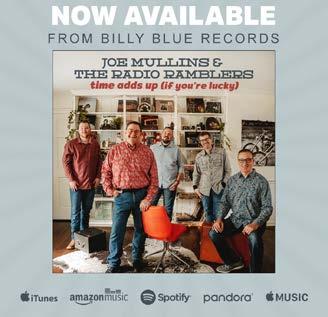
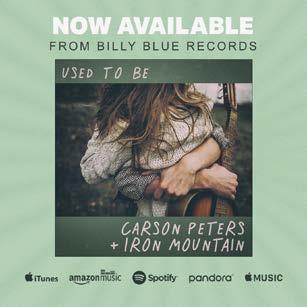
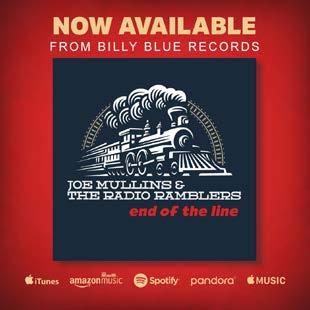

by Stephen Pitalo
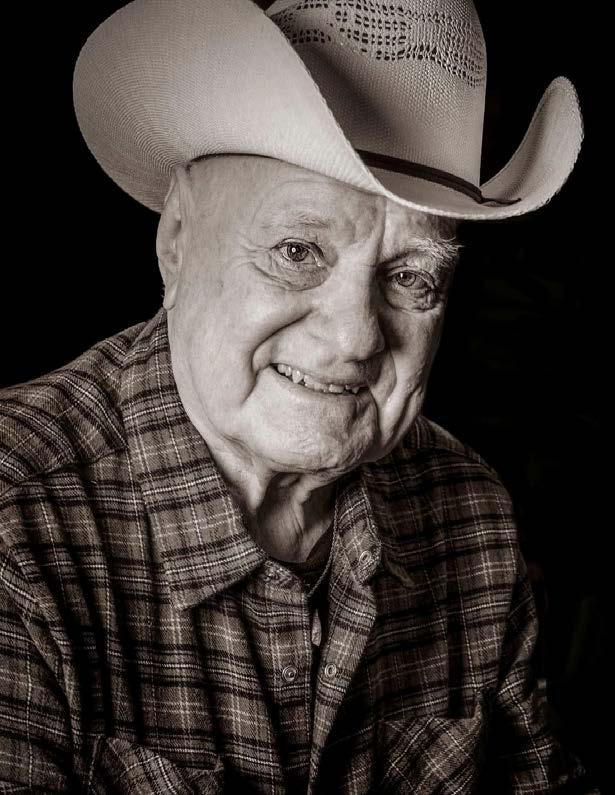

If you walk through North Carolina and ask about Clyde Mattocks, people will tell you stories. Not just stories about his music, but stories about the man how he’s still out there, steel guitar in hand, grinning, playing, teaching, raising up the next crop of musicians while half his peers have long since gone home to sit on the porch and talk about what they used to do. Come October, Clyde will be inducted into the North Carolina Music Hall of Fame. The thing about Clyde is, he’s not interested in the laurels he’s too busy doing the thing to worry about what people are pinning on his lapel.
“That’s quite an honor. It’s not really sunk in yet,” he says. “I’ve been playing music over 70 years and it just all runs together.”
That’s not false modesty. That’s a man who’s done so much, seen so much, played so many kinds of music pop, bluegrass, hardcore country, rock — that the years smear into one long road, dotted with bars, stages, and radio towers. He remembers the moment the music grabbed him. It wasn’t in a studio or a formal lesson. No, it was standing out on the sidewalk as a kid, listening through an open window to a family across the street playing music. “One night a steel guitar player showed up and the light went on and I said, that’s that sound I’ve been hearing,” he laughs. “I thought it was just a regular electric guitar that was making that sound. And then when I saw the steel guitar, it just set me on fire.”
So, Clyde lobbied his parents hard, and at 14, Christmas brought him a lap steel guitar. “I was making some pretty awful music by that night,” he admits. “And I was playing in a band in six weeks because back then, people couldn’t tell whether you were playing one good or not.”
That mix of sly humor and sharp honesty marks Clyde’s whole career. He’s been called the best pedal steel player in North Carolina maybe even the world but Clyde shrugs that off.
“That’s so subjective to say the best. I never considered myself the best. Why I stay in it at my age is simply to watch these people grow and become good musicians. Actually, I’ve always been able to see the potential in people very early on when my peers didn’t.”
His band history is as tangled and lively as the music itself. You’ve got the Super Grit Cowboy Band, where Clyde blended country with the rising wave of West Coast rock. “For about three months, people hated us,” he says. “We were too rock for country and too country for rock. But about that time, the wave hit, and from that day, we could do no wrong.”
Ask Clyde about why bands fall apart, and he’s seen the same story play out again and again. “Most of the time, it’s wanting the need after they have families, the need to make more money… a lot of times, it’s wives and girlfriends. I’ve seen guys give up music just because of a girlfriend. And then they lose the girlfriend, and they’ve lost their girlfriend and their gig.”
You talk to Clyde long enough, you realize he doesn’t chase drama. “I have always been a fairly calm person and try to resolve conflicts and not take sides.” He jokes that people have called him “a benevolent dictator” when he leads bands a boss, sure, but one who looks out for his people.
And bluegrass? That’s home base. “I love the straight stuff Flatt and Scruggs, the
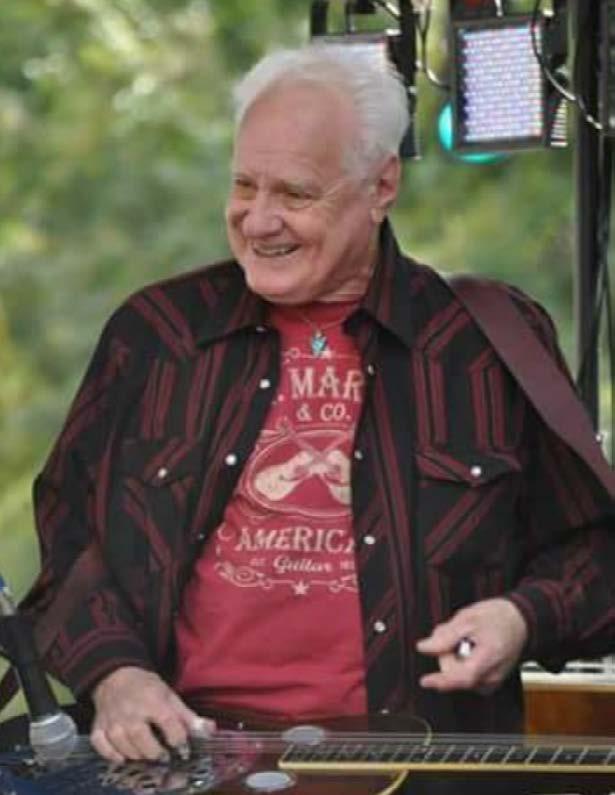

Stanley Brothers. But these days, the dobro is my number one thing.” Even when playing with the loudest rock bands, Clyde laughs, “We would roll our set with straight-ahead bluegrass… and when you’re on a concert bill with five or six rock bands, it’s really refreshing to the crowd to come out there and hear that banjo cracking their attention.”
His connection to his instruments runs deep. When asked if a good instrument can make a player better, Clyde says, “I think instruments have a soul… certain instruments can inspire you to play better.” He knows the magic of picking up something like the 1949 Gibson console he now plays: “It wasn’t my favorite steel for a long time… until I got it. And then when I got it oh. It’s the response you get out of it.”
At the moment, Clyde is recording with the Lovesick Drifters, a Hank Williams tribute band. Ask him what it is about Hank that draws people decade after decade, and he doesn’t miss a beat: “It’s the songwriting.” And he loves the stories like how Don Helms’ steel guitar playing first amazed him, or how Helms used to scoop up Gibson console grands from pawn shops because fans wanted to own a guitar his hands had touched.
As for what’s left for Clyde to do, he chuckles. “I played all my licks and played every kind of venue. I’ve played theater shows where I had to wear a tux, and the next night played at a biker bar where you had to wear all black. But now? Forget this legend stuff. I’m just trying to be relevant today.”
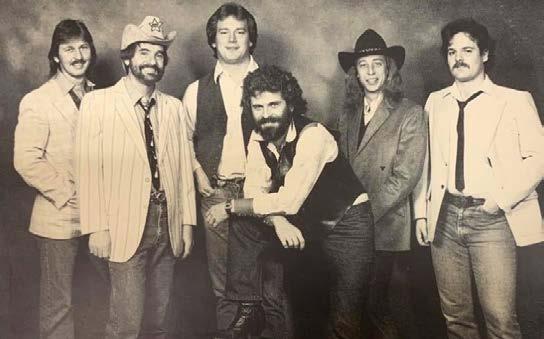


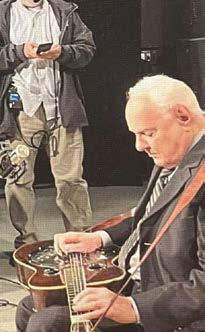
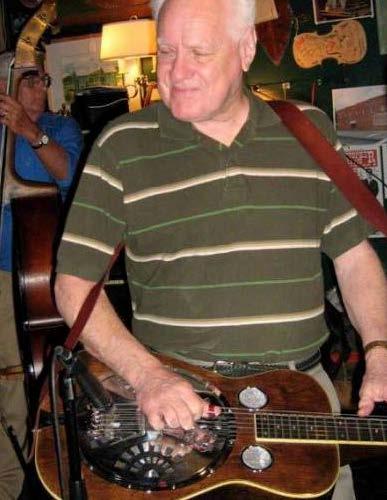

by Susan Marquez


Ty Gilpin is an artist, artist advocate, and until recently, the Senior Director of Marketing for Crossroads Label Group’s celebrated bluegrass and Americana imprints, Mountain Home Music Company and Organic Records. He spent two decades with Crossroads before deciding to step away at the end of 2024. “It was a move driven by a desire to grow, to stretch creatively and professionally,” says Ty, “and to work more directly with a broader and more diverse community of artists beyond the walls of a traditional label structure.”
Ty says that throughout his time at Crossroads, he had the privilege of championing artists who were not only music heroes but personal friends. But he felt a pull toward something more agile that allowed for a fiercely artist-centric approach to creative development.
“I envisioned a model where artists weren’t just ‘signed,’ but partnered with—a relationship built on shared agency and a genuine enthusiasm for the artist’s potential.”
Growing up in the Nashville area exposed Ty to music from an early age. “It was not uncommon to run into famous people. I went to school with the kids of iconic country music stars like the Oak Ridge Boys and the Mandrells.” While he had a diverse musical background interest-wise, Ty was culturally exposed to bluegrass. “I always liked bluegrass because of the sense of community. I liked the fact that it was participatory. There’s something about people making music together, telling
stories, and keeping traditions alive, although I think it is also important for the music to evolve.”
But now, after twenty years, Ty is taking a step towards a new vision - Shift Music Services, a next-generation, “atomized label” he co-founded with industry veteran Mark Scearce. Together, they built a nimble, independent platform for recording, distributing, and promoting music, especially within the bluegrass space, putting artist growth at the center of every decision.
Shift is proudly based in Asheville, NC—Ty’s hometown and a cultural anchor for so many creatives. “In the aftermath of Hurricane Helene, which struck both the physical and economic heart of the city, we committed ourselves to being part of the rebuild. Our office and studio in the River Arts District isn’t just a workspace; it’s a creative hub meant to be a part of helping to restore and re-energize Asheville’s artistic pulse.”
As an independent contractor, Ty works across consulting, video marketing, radio promotion, content creation, and music production. His clients range from rising acts like The Asheville Mountain Boys and Rudy’s Bluegrass Review, to established names like Zoe & Cloyd, Songs From the Road Band, all the way to bluegrass legends like Lonesome River Band.
“I also have a partnership with Nashville’s fantastic Turnberry Records— doing radio support for
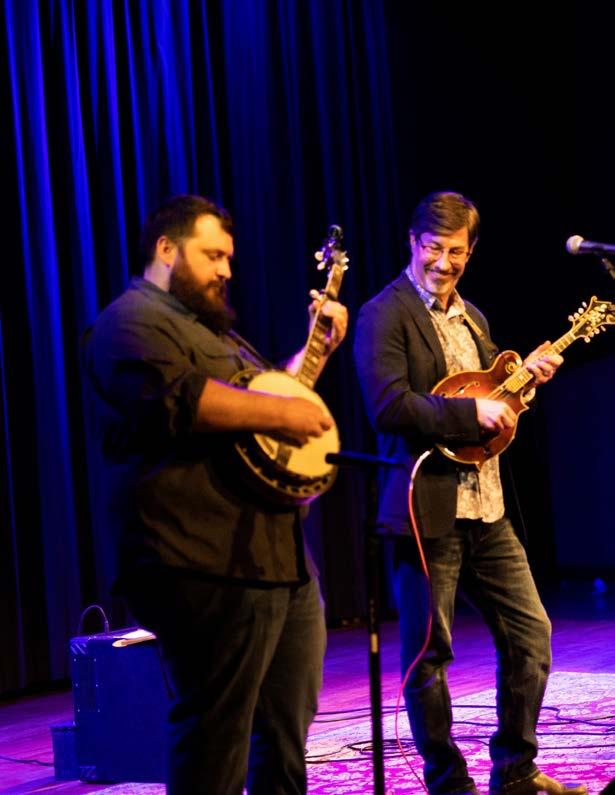
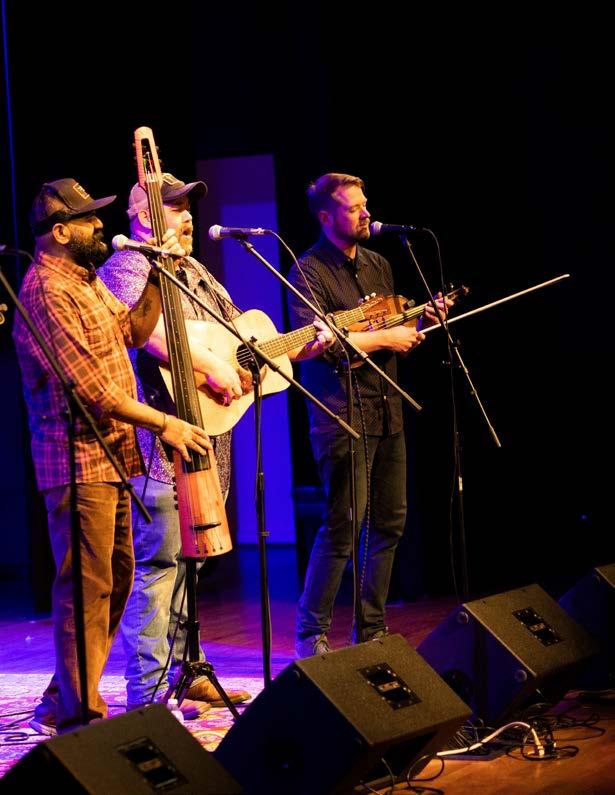

artists like Junior Sisk, Donna Ulisse, Kevin Denny, Matt Wallace, CJ Lewandowski, and Greg Blake, along with many more. I’m also grateful for an ongoing collaboration with artists Nu-Blu, who helped me beta-test and refine my processes, and I am excited to see their efforts grow.”
In parallel, Ty remains creatively active as a performer with Unspoken Tradition, a band that has grown into a national touring act with a deeply rooted identity. “Our recent release, Resilience, brings together songs recorded over the past few years—a reflection of not just personal or regional survival, but a broader cultural endurance. It’s a message we carry with us on stage across the country, connecting with audiences who understand that perseverance is a universal language.” Ty says that for him, resilience is more than a title. “It speaks to the Appalachian ethos. It’s a generational inheritance, passed down through my Appalachian roots. And it’s the quality I’ve leaned on most in this new chapter, leaving the security of a 20-year role to build something meaningful and independent. The music industry is as unpredictable as it is exhilarating, and navigating it with integrity requires clarity, compassion, and grit.”
At the end of the day, Ty Gilpin’s mission remains simple: to help artists thrive by giving them the tools, advocacy, and a collaborative path forward in a rapidly changing world. Because in times like these, great art is essential. ty@shiftmusicservices.com
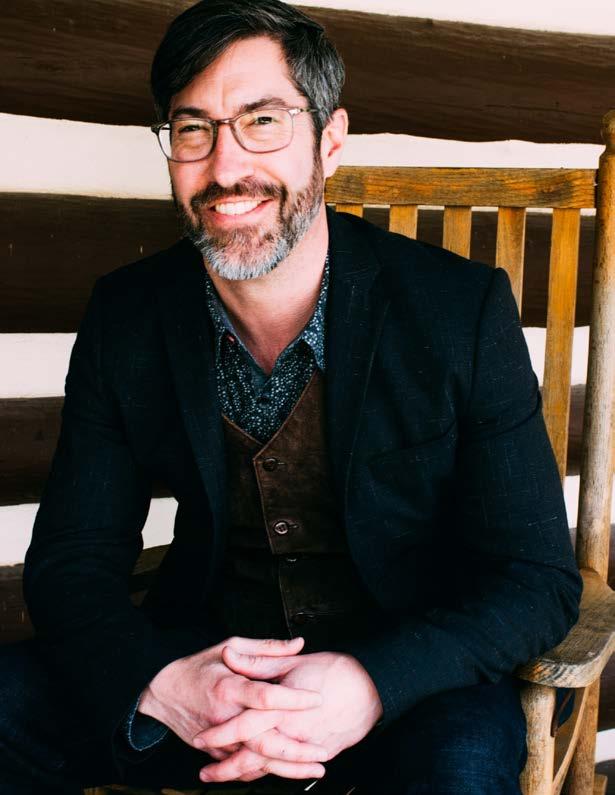

by Brent Davis
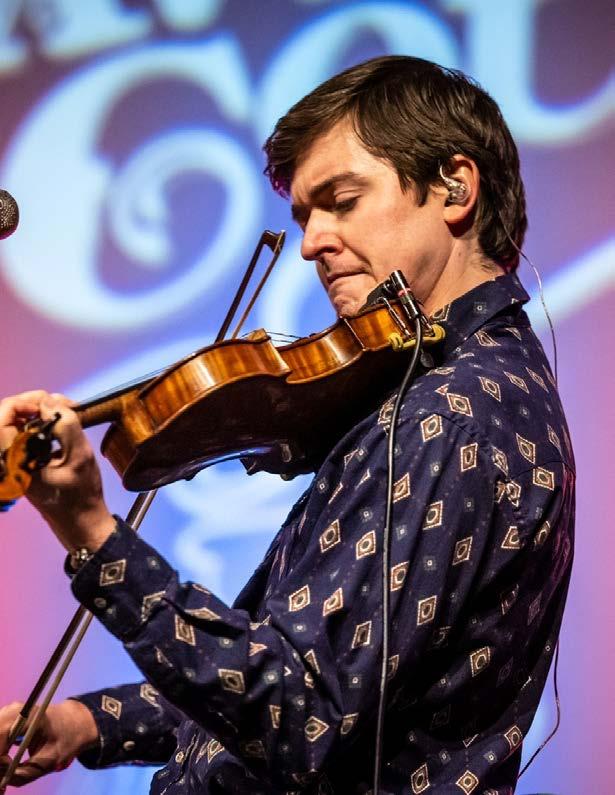

Someday, when Christian Ward is reminiscing, he might remember 2025 as a really big year.
After all, that’s when he joined not one but two of the pre-eminent bands in bluegrass.
Ward is the new fiddler with The Del McCoury Band and The Travelin’ McCourys. The position opened when Ward’s predecessor, Jason Carter, left to pursue a solo career.
“It’s a pretty, pretty cool thing,” Ward admits. “I wasn’t expecting it. I’d filled in on the Opry a few times, and I’ve done a couple dates with Del and a couple with The Travelin’ McCourys. But I didn’t necessarily see this coming.”
Ward grew up in Southern California and took up the fiddle at an early age.
“I started playing when I was about four or five,” Ward explains. “I got a few lessons, and I got a little violin and everything, so I knew that’s what I wanted to play, but I didn’t really take it too seriously until I was about nine.”
Early on, he was surrounded by bluegrass. His stepfather, Eric Uglum, is a well-known guitarist, singer, and producer/engineer who was in bands such as Weary Hearts, New Wine, and Chris Stuart and Backcountry.
“Pretty much all of my bluegrass was kind of a direct result of his influence since he had been playing all through his teens and adulthood. I don’t think I really had any musical aspirations before he came into the picture. He also had a recording studio out of our house so that brought a lot of musicians into my midst,” Ward says.
Among the musicians in that Southern California scene was Grammy winning
fiddler Stuart Duncan, who became one of Ward’s early influences.
“His playing really kind of spoke to me. He played quite a bit with my stepdad. And as far as more current players go, Aubrey Haynie had some great solo records that I really liked early on. And then from there I went back and started exploring guys like Bobby Hicks and Kenny Baker and Benny Martin.”
Ward was fiddling in bands by the time he was 13. Along with his brother Austin, a bassist, Ward played with his stepfather in Eric Uglum & Sons and with Chris Stuart and Backcountry.
Ward also had stints with Sierra Hull and Highway 101, Bradford Lee Folk and the Bluegrass Playboys, Rebecca Frazier and Hit and Run, and guest appearances with Billy Strings. Prior to his current gig he was principally a freelancer and gigging with many artists. That requires a musician who can learn a lot of music quickly--a useful skill now as Ward is learning the substantial catalogs of two bands.
“It seems like every time we play a show there’s a few more songs that we add in. And Del takes a lot of requests, too, so you never know what he might feel like doing on a given night. It keeps me on my toes for sure.”
In addition to fiddling, Ward is a successful songwriter. “Red Daisy,” which he co-wrote with Jarrod Walker, was the International Bluegrass Music Association Song of the Year in 2022. Billy Strings recorded it.
“Somehow writing a song about a flower and putting that sort of Stanley-esque rhythm and melody to it kind of worked.” Ward says. “I’m pretty sure there wasn’t a
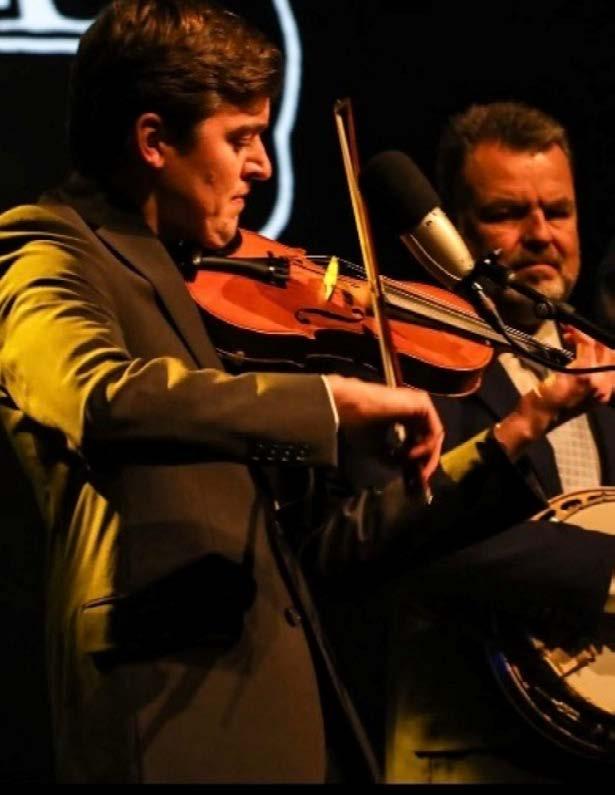

whole lot of editing on that one. The irony is that we spent all weekend on this other song that never sold and that one probably took us about half an hour to get a demo going.
“That’s kind of the thing that keeps me really interested in songwriting. It’s unpredictable. All you can do is show up and try to use your tools. The output that you get from your work doesn’t always correlate with how much energy you’ve expended. There’s just something in the air on a given day and it works out and you kinda have to know when to keep working at an idea and keep chipping away at it.”
Before moving to Nashville a few years ago, Ward lived in Birmingham, Ala. It was close enough to Nashville to commute to gigs. While he was there he completed a degree in creative writing at UAB.
“I took some workshops and studied fiction and poetry, and had a mentor who was really influential. I got a lot less precious about my writing in general. And I don’t think it’s any coincidence that the year that I was finishing up my creative writing studies was the first year that I started writing songs on a more serious level.”
In his new role in both The Del McCoury Band and the Travelin’ McCourys, Ward is not just the new guy--he’s the young guy sharing the stage with artists who for decades have been considered to be some of the best musicians in bluegrass. He says he’s excited about the opportunity.
“I look up to those guys. They’re some of the most seasoned bluegrass musicians of all time. I guess I like to think that I bring something to the table creatively. But I just have a ton of respect for how long they have been doing it and the high level that they’ve been doing it.”



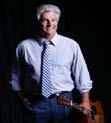


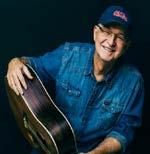


by Stephen Pitalo
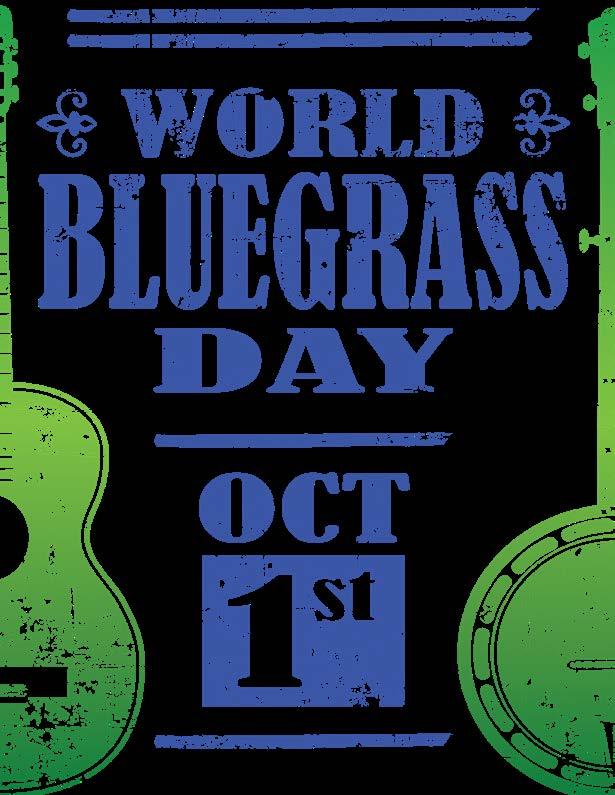
Chris Hanscom didn’t set out to start a movement. He was just heading to the woods with his wife.
It was about ten years ago near Gatlinburg, Tennessee. They were on a hiking trip. Then somewhere between the map and the mountain — they caught a live bluegrass performance. And something clicked in Hanscom’s head.
“I was instantly mesmerized by the sound — it just hit me in a way nothing else had,” said Hanscom. “Not long after that, I bought a banjo and started learning to play. The more I played, the more curious I became about the roots and history of bluegrass music.”
That curiosity didn’t end at the fretboard. Hanscom started digging. Deep. Through regions, through stories, through time. He wasn’t just learning licks he was tracing the fingerprints of a culture.
“Since I’ve always been someone who likes to dig into the how and why behind things, that curiosity took me down a rabbit hole that stretched across the globe,” he said. “Along the way, I realized there wasn’t a specific day set aside to truly celebrate this uniquely American sound. That didn’t sit right with me so I decided to do something about it.”
World Bluegrass Day was born in 2020. Not as a holiday. As a mission. And as of August 2024, that mission has Hanscom’s full attention.
is my full-time gig now.”
It’s a gig that’s as much about preservation as it is about celebration. Because to Hanscom, bluegrass isn’t just music it’s memory, it’s place, it’s people.
“The heart of bluegrass lies in its stories— real, raw, and rooted in everyday life,” said Hanscom. “To preserve the genre, we must pass down the personal histories behind the songs, the regional playing styles, and the oral traditions that shaped the music before it was ever recorded. It’s crucial that future generations understand not just how to play the music, but why it was played, who it gave voice to, and what it meant to the communities it came from.”
That’s where the real work begins: education, context, connection. And names the ones etched into the wood of the music and the ones that never made it to liner notes.
“Teaching the legacies of pioneers like Bill Monroe, the Stanley Brothers, and countless lesser-known contributors ensures the roots remain strong as the branches grow,” he said.
But Hanscom isn’t only looking backward. Built on the idea that the genre doesn’t belong to one type of person or one kind of sound, World Bluegrass Day belongs to everyone.
“About a year ago, I dedicated myself fully to the mission of World Bluegrass Day,” he said. “Starting August 2024, I’ve committed all my time to the mission. This
“Bluegrass was never just one thing,” said Hanscom. “It’s a blend of African American blues, Scots Irish fiddle tunes, gospel harmonies, and more. Honoring that multicultural heritage isn’t just accurate, it’s essential to the spirit of the music.”
According to Hanscom, that spirit gets stronger every time someone outside the “usual suspects” picks up a banjo, sings a harmony, or brings a new flavor to an old form.
“World Bluegrass Day promotes inclusion by creating space for all voices, inviting people of diverse backgrounds to participate, learn, and lead,” he said. “Whether it’s highlighting underrepresented artists, supporting youth and international programs, or fostering respectful dialogue, the goal is to build a bluegrass community that reflects the world’s richness while staying true to the genre’s roots.”
And nothing keeps that genre rooted — or alive — like community. Not industry, not charts, not even record labels. The people in circles, not spotlights, carry the sound forward.
“Bluegrass has always thrived in community,” said Hanscom. “It lives around campfires, at kitchen tables, in church halls, and on festival stages. Local jams are where players learn, connect, and grow.”
And when that local jam echoes across continents at international festivals, something powerful happens. The circle widens. The song grows.
“International festivals bring exposure and energy,” he said. “Together, they form a living network that keeps bluegrass from becoming a museum piece. World Bluegrass Day encourages both, reminding us that no event is too small to matter, and no stage too big to feel like family.”
Still, even as the genre branches out, there’s always a push-pull between tradition and experimentation. For Hanscom, the answer isn’t to choose it, it’s to respect the balance.
“World Bluegrass Day recognizes that tradition and innovation are both part of bluegrass’s DNA,” he said. “After all, Bill Monroe was an innovator in his time. The goal isn’t to draw hard lines—it’s to celebrate the roots while welcoming new branches.”
Hanscom doesn’t want to be a gatekeeper. He wants to open the barn doors and let the next generation run through, instruments in hand.
“That might mean honoring the classic five-piece lineup one moment and spotlighting a genre-bending collaboration the next,” he said. “The key is respect, and honoring the structure, soul, and storytelling of traditional bluegrass while encouraging the kind of experimentation that keeps the genre exciting and relevant for new generations.”
Because in the end, this is a global sound now. It’s gone from Appalachian hollers to concert halls in countries that don’t even have the word “holler.”
“World Bluegrass Day is helping write a chapter where bluegrass belongs to everyone, everywhere,” said Hanscom. “It’s creating a platform that not only celebrates where the music came from but invites new voices into the circle. Through education, exposure, and storytelling, it helps pass the torch.”
And maybe that’s the point of it all not to hold onto the music, but to hand it off. One picker, one storyteller, one hiker-turned-banjo-player at a time, and Hanscom hopes you join the celebration on October 1st.
“By connecting global communities, it makes the genre more accessible and visible,” said Hanscom. “Bluegrass’s next chapter is global, diverse, and deeply rooted in tradition— and World Bluegrass Day is one of the bridges helping it get there.”
Inquiring minds can learn more here: https://www.youtube.com/@WorldBluegrassDay
Get Your Official World Bluegrass Day Poster: https://musicthings.myspreadshop.com/all

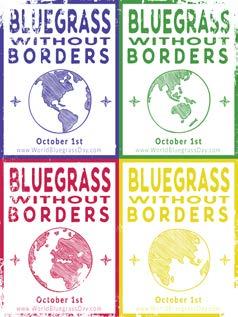
by David H. Lauver

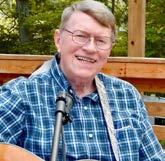
“Pardon me, boys (and gals) . . . Is that the Chattanooga venue?”
From September 16-20, we’ll get a lively answer to that question in “The Scenic City” on the Tennessee River.
When IBMA’s “World of Bluegrass” comes to Chattanooga, you’ll hear music from the convention center to venues and parks across the revitalized downtown.
Who knows? A Bluegrass band might even cover “Chattanooga Choo Choo.”
The big band swing tune recorded by Glenn Miller’s Orchestra has a claim to fame that echoes across musical genres. In 1942, the song written by Mack Gordon and Harry Warren sold more than 1.2 million copies. That made it the first Gold Record certified by RCA Victor.
I’m not sure if the Hollywood tunesmiths ever made it to Chattanooga, but their “Choo Choo” took them to membership in the Songwriters Hall of Fame.
During IBMA’s “most important week,” the Bluegrass Hall of Fame will induct the bands Hot Rize and The Bluegrass Cardinals, as well as Arnold Shultz, an African American musician who mentored “Father of Bluegrass” Bill Monroe.
Hall of Fame members will head the list of honorees at the 36th annual IBMA Bluegrass Music Awards, presented by Get It Played, on Thursday evening, Sept. 18.
The awards show will be in Chattanooga’s Soldiers and Sailors Memorial Auditorium. That historic hall opened in 1924 as a tribute to those who served in World War I. It has hosted Grand Ole Opry package shows and pioneer Bluegrass performers.
Up on nearby Walden’s Ridge, the weekly Mountain Opry provided a community stage for young Bluegrass musicians and visiting professional pickers. During its 40-year run, the Mountain Opry attracted capacity crowds and even gained network television coverage.
Here are a few local area musicians who went on to play in the national spotlight. Chattanoogan Bob Johnson was a member of Bill Monroe’s Bluegrass Boys. When he left the band, Johnson made news with his “Bluegrass Banjo” recording backed by a full orchestra.
The Louvin Brothers started on their road to the Country Music Hall of Fame by winning Chattanooga talent contests in the 1940s. Ira and Charlie Louvin’s close harmony is said
to have influenced many Bluegrass vocalists.
Fiddlin’ Bob Douglas (he became the first 100-year-old performer on the Grand Ole Opry) hired the Louvins and other local musicians to perform on Chattanooga’s WAPO radio. The name of their group? Chattanoogan.com says they were called “The Foggy Mountain Boys”—five years before Flatt and Scruggs chose that name for their better-known band.
Later listeners got to know the Louvins in 2003, when Carl Jackson produced the Grammy-winning “Livin’, Lovin’, Losin’—Songs of the Louvin Brothers.”
That tribute album features a stage full of Bluegrass, Folk and Country stars. The duet of “How’s The World Treating You” by Alison Krauss and James Taylor also won that year’s Grammy for Vocal Collaboration.
Hall of Famer Norman Blake
Norman Blake, who was inducted in 2022, is the most recent Bluegrass Hall of Fame member with IBMA host city ties. The multi-instrumentalist performer and singer-songwriter was born in Chattanooga and raised just across the state line. He and his wife Nancy—a talented musician in her own right—live in nearby Rising Fawn, Georgia.
In an interview on “Songbird’s Radio Hour” (available on wutc.org and songbirdsfoundation. org), Blake said his first guitar was “a $14 Stella from a pawnshop in Chattanooga.” Mastering that instrument led to a career of more than 60 years playing guitar, mandolin, dobro and fiddle.
In 1972, Blake joined The Nitty Gritty Dirt Band and Bluegrass and Country icons on the Platinum-selling “Will The Circle Be Unbroken” album. Nearly 30 years later, he received a Grammy for his work as a featured performer on the “O Brother, Where Art Thou” soundtrack. Both projects are credited with introducing new generations to traditional music.
Blake worked with Johnny Cash and June Carter Cash as a studio musician and member of the house band on ABC television’s “The Johnny Cash Show.” He toured with Kris Kristofferson, backed Bob Dylan on the “Nashville Skyline” album and played on the Joan Baez hit, “The Night They Drove Old Dixie Down.”
I look for forward to joining many Bluegrass Standard readers in Chattanooga. We’ll pay tribute to the heritage of Bluegrass, celebrate its continuing creativity, and have a good time in the process.
If you’re traveling in the Volunteer State before or after the IBMA festival, you also might enjoy these events: Crossville’s Cumberland Mountain Songwriters Festival, Sept. 5-6, (see “Cumberland Mountain Song Crafters” on Facebook); Nashville’s “Americanafest,” Sept. 9-13 (americanamusic.org); and Bristol’s Rhythm & Roots Reunion, Sept. 1921 (bristolrhythm.com).
by Candace Nelson

Across the 13-state Appalachian region, from West Virginia to Mississippi, well-known names have created food experiences that blend entertainment, personality, and regional charm. Some are rooted in hometown heritage; others bring global flair to mountain towns. All share one thing in common: a tie to someone famous.
In West Virginia’s Eastern Panhandle, Hollywood Casino at Charles Town Races offers more than just live horse racing and slot machines. Inside the sprawling entertainment venue sits The Eatery by Fabio Viviani, a food court concept led by the celebrity chef known from Top Chef. The Eatery brings five distinct counters under one roof, each featuring Viviani’s culinary touch. Patrons can choose from gourmet burgers, artisan pizzas, traditional Italian pastas, Asian-inspired dishes, and desserts—all paired with craft beer options. Viviani’s presence is part of a national trend of celebrity chefs partnering with casinos, but here in Charles Town, it brings an upscale twist to Appalachian dining.
Further south, in Pigeon Forge, Tennessee, the culinary influence of household names is especially prominent. Dolly Parton, one of the region’s most iconic figures, has long intertwined entertainment and hospitality. At Dolly Parton’s Stampede Dinner Attraction, visitors watch a theatrical show featuring horse-riding stunts and special effects while enjoying a four-course Southern-style meal. The menu includes rotisserie chicken, hickory-smoked pulled pork, buttery biscuits, and classic sides—served without utensils to enhance the experience.
A few miles away, another attraction from Dolly Parton brings fantasy to the table. Pirates Voyage Dinner & Show presents a swashbuckling performance complete with pirates, mermaids, acrobatics, and a dramatic lagoon stage. Guests dine on a themed meal featuring roasted chicken, sugar-cured ham, creamy vegetable soup, and peach turnover—all while immersed in a high-seas adventure set in the Smoky Mountains.

Just around the corner is Downtown Flavortown, a massive dining and entertainment venue created in partnership with Guy Fieri. Known for his signature spiky hair and catchphrases on Diners, Drive-Ins and Dives, Fieri’s Gatlinburg location is packed with attractions: an arcade, a bowling alley, and bold dishes like Dragon’s Breath Chili Cheese Fries, Trash Can Nachos, and Bacon Mac ‘n’ Cheeseburgers. The venue captures the chef’s over-the-top persona and has become a popular stop for tourists exploring the area.
Also in Pigeon Forge, Paula Deen’s Family Kitchen offers a different kind of Southern hospitality. The restaurant, located at The Island, serves up family-style meals with recipes straight from the celebrity chef’s cookbooks. Fried chicken, collard greens, baked mac and cheese, and ooey-gooey butter cake make up some of the menu staples. While Paula Deen herself doesn’t cook in the kitchen, she has made promotional appearances and lent her name and recipes to the brand, which now includes locations throughout the South.
Another major personality in Pigeon Forge’s entertainment lineup was the late Jimmy Buffett, whose Margaritaville restaurant sits at the heart of The Island. Inspired by the singer’s laid-back, beachy aesthetic, the restaurant serves tropical cocktails, cheeseburgers, fried seafood, and Key lime pie. Island-themed décor, live music, and tiki bar drinks turn the Appalachian foothills into a slice of paradise for fans of Buffett’s music and lifestyle.
Country star Blake Shelton has also made his mark on Gatlinburg with Ole Red, a music-themed restaurant named after his 2002 hit song. The venue combines live music, Southern cuisine, and rustic style. Guests dine on dishes like chicken-fried steak, honeydrizzled cornbread, and pulled pork sandwiches, often while local musicians perform on stage. Part of a growing chain, Ole Red in Gatlinburg anchors itself in Appalachia with a focus on regional flavors and country roots.
These restaurants and entertainment spaces are more than tourist attractions. They represent a growing fusion between Appalachian hospitality and national celebrity culture. While the food often leans into comfort and familiarity—fried chicken, biscuits, barbecue, and burgers—it’s elevated by the name recognition and immersive environments each celebrity brings. Whether it’s Fabio Viviani’s international flair in West Virginia, Dolly Parton’s theatrical feasts or Guy Fieri’s over-the-top creations in Pigeon Forge, these destinations reflect how Appalachia continues to evolve while embracing its traditions.
In the heart of the mountains, fame has found a new frontier—and it’s served with a side of mashed potatoes. These restaurants are more than just places to eat; they are destinations that reflect a changing Appalachian identity. As the region embraces tourism, entertainment, and culinary innovation, these celebrity-connected venues offer a unique blend of local flavor and global appeal. They introduce visitors to the warmth and hospitality that Appalachia is known for, while also offering the kind of name recognition that draws crowds. Behind every themed dining room and signature dish is a story—of a singer’s hometown pride, a chef’s creative vision, or a community’s desire to reinvent itself without losing its roots. In a region historically defined by its coal mines and country roads, the rise of branded eateries and dinner attractions shows how Appalachian towns are reimagining their future. With every biscuit served, every performance staged, and every tourist welcomed, these establishments help tell a broader story—one where Appalachian culture continues to grow, thrive, and surprise, one plate at a time.

